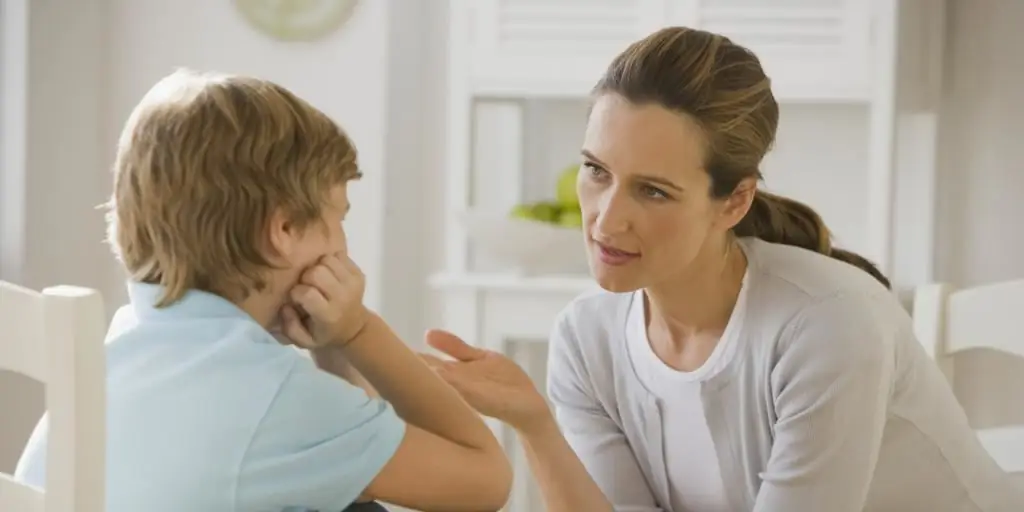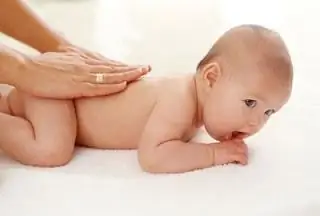2026 Author: Priscilla Miln | miln@babymagazinclub.com. Last modified: 2025-01-22 17:55:15
How to tell a child about the war? What is it for? Parents often worry that scary stories about the war can cause nightmares. And indeed, it is not necessary for the kids to explain all the details of the hostilities. Information should be dosed, taking into account the age of the child. At the same time, knowledge of historical events, pride in the country is the basis of patriotic education. Children should remember the heroism of their ancestors, their exploits.
Why should kids talk about the war?
Knowing the history of one's country is the main stage in the development of a child's personality. The story of the fighting will help the boy to form the image of a courageous and courageous hero. Girls will be more interested in women's roles during the war - taking care of children, wounded soldiers.

Stories about feats of arms help to develop a sense of patriotism, pride in one's country and people. It is difficult to tell a child about the Patriotic War at one time. Therefore, it is best to divide the conversation into several parts.
How to tell a child about the war? Shouldtake into account age characteristics when drawing up a conversation plan. The smallest ones can read small poems about the war, talk about medals and awards. Older children will be interested in technology, weapons, heroic deeds.
For clarity, parents should take their child to a museum or to a monument of military glory. Visual perception will strengthen the understanding of the heroic feat of the country, help to realize the inadmissibility of military operations in the future.
Battlefield
How to tell children about the Great Patriotic War? How not to scare a child with the horrors of battles? Talking about the Patriotic War, it should be explained that Nazi Germany attacked the Soviet Union. The insidious plan of the enemy was to destroy the sleeping, unsuspecting people as quickly as possible.
In a conversation with a child, it is imperative to indicate that the whole country has united against the invaders. Fights took place not only in specially designated places - on military fields. Hostilities arose wherever enemies appeared. In every city or village, the inhabitants defended their freedom, not wanting to submit to the invaders.
So the partisans appeared. These are people who did not serve in the army, but carried out underground activities, protecting their people. They hid in the forest, destroyed the enemy, disabled military equipment.
Soldiers who went to the front fought in whole detachments, divisions. These were the most ordinary citizens who wanted to help their country.

How to correctly tell children about the war of 1941-1945? From whatage should you start talking? By the age of 3, the child already understands who enemies and friends are. At this age, do not go into details. Suffice it to say that our country won this war. On May 9, citizens celebrate their triumph. On Victory Day, veterans put on orders, military songs are played, and fireworks are arranged.
Why did the war start?
How to tell children about the Great Patriotic War? How to explain to them why it started? Such questions concern parents, young kindergarten teachers. Before Victory Day, preschool institutions hold talks about the heroes of the war, learn poems and songs.
It should be explained to children that interstate conflicts can occur for various reasons. For example, the leaders of the countries quarreled, or the enemy wanted to capture a rich and prosperous area. The war with Nazi Germany had completely different reasons.
The fascist ruler decided to kill people based on their nationality. Only the Aryan race had the right to live and dominate the planet. All other nationalities (Russians, Poles, French, Armenians, Jews) were to be destroyed or completely submit to the fascist regime.
In this regard, it should be clarified that people of different nationalities also lived in Germany. This country was the first to suffer from the Nazis. In order not to become slaves of the Nazis, the Russian people decided to defeat the enemy.
How to tell a child about the war? How to explain its name? The fatherland is the native side in which the house, the family is located. Soldiers fought for their country, children,wives, parents. Therefore, the Patriotic War received such a name.
Military equipment and military professions
How to tell children about the war? Where to begin? You can remember that each person has his own profession. There are doctors, workers, teachers, salesmen. And there are military professions. People are specifically trained in the basics of tactics and strategy. Even in peacetime, military equipment is being developed - aircraft, weapons, tanks, rocket launchers.
During the war, people of military professions become commanders. These are generals, marshals, who determine on the map where the enemy will go, where it is better to catch and neutralize him.

Pilots, signalmen, doctors - during the war they were in the hottest spots. Tanks, ships, artillery, aircraft - all military equipment was controlled by trained people. There were battles not only on the streets of cities, but also in the air, at sea.
Women who were in the rear, worked in factories, fields, sewed military uniforms, prepared weapons. Many of them went to the front as nurses. The Second World War brought devastation and grief. You can tell the children about how the guys worked in the rear with their mothers in factories, how there was not enough food, how the enemies blew up houses, how people hid in bomb shelters.
Poems, stories, songs
To tell children about the war of 1941-1945, poems and stories written specifically for preschoolers will help. S. Alekseev has miniatures about the siege of Leningrad (“Fur Coat”, “First Column”). The story of A. Mityaev “The bagoatmeal”will tell about the relationship of the soldiers. V. Bogomolov has a sketch "Eternal Flame" about the defenders of Stalingrad.
L. Kassil and A. Gaidar wrote about military topics. You can include poems by A. Tvardovsky, V. Vysotsky in the conversation. Songs of the war years ("Cranes", "Katyusha") after listening can be learned with older preschoolers.
You can tell children that in the intervals between battles, soldiers rested, composed poems, talked, remembered relatives, wrote letters. The songs of the war years helped to survive in an unequal struggle. These are "Holy War", "In the Dugout", "Dark Night", "Alyosha", "Darkie", "Blue Handkerchief", "Oh, roads", "Road to Berlin".
Stories, songs, poems should be selected taking into account the age of children. After listening, you can arrange a conversation on the content of the thumbnail. Photographs of the war years, famous reproductions will help enhance the impression of the story.
Hero-cities
During the conversation about the war, it is necessary to remember that there are hero cities. This honorary title is awarded to a locality for the courage and heroism shown by its inhabitants. Such cities are located on the territory of Ukraine, Belarus, Russia.
Brest Hero Fortress was the first to take the blow of the enemy. The soldiers resisted to the last, trying to gain time. Almost all the defenders of the fortress fell in an unequal battle. The fight went on for a whole month. All this time, a red flag was flying over the fortress - a symbol of the courage and unity of the people.

Hero City Odessa is a beautiful port on the Black Sea coast. The Nazis gradually took over the streets. The trenches and barricades no longer helped - the enemy army was so great. But the inhabitants of Odessa did not give up: they left the city and hid in the catacombs. This is the name of a huge space underground. Tunnels several tens of kilometers long hid the local population from the Nazis. And then the subversive war began. Odessans, getting out of the catacombs at night, set fire to houses with Nazis, disabled trains.
The hero-city of Leningrad was in the enemy's ring. The Nazi troops surrounded the northern capital - they did not let people out and did not allow food carts to enter its territory. The blockade of Leningrad lasted almost 2 years. People were starving, heating did not work. But the residents survived the test. They did not surrender to the enemy. They were not afraid of the winter cold, hunger, exhausting work, illness. Their courage to this day serves as an example to posterity.
Awards
How to tell children about the Great War? You can try to motivate the child to think independently. For example, ask the following question: "What do they get medals and orders for during the war?" Children in senior preschool age can already tell for themselves what courage, feats, courage the soldiers received awards for.

Fighters and commanders during World War II were awarded medals ("For Courage", "For Military Merit"), orders ("Red Banner", "Red Star").
For the defense of hero-cities issued special awards "For the defense of Moscow", "For the defense of Sevastopol", "For the defense of Leningrad".
Orders of Kutuzov, Nevsky, Suvorov were received by commanders for success in managing detachments, divisions. The Order of the Patriotic War was awarded to ordinary soldiers, partisans, the commanding staff of the Red Army and the Navy.
Child Heroes
Preschoolers understand more about the image of children like themselves. How to tell a child about the war? Tell about heroic children who, not afraid of reprisals, helped the country win.
Vitya Khomenko learned excellent German at school. He got a job in the dining room of the Nazis, where he washed dishes, served the officers, listened to the conversations. Often the Nazis, not knowing that the boy understood their language, blurted out military secrets. Vitya Khomenko reported information to the partisan detachment. He also delivered weapons and explosives to the underground. He was executed along with other partisans.
Lara Mikheenko was far from home. For the summer holidays, she went to the village to her relatives, where the war found her. The settlement was captured by the Nazis. Lara decided to help the partisan detachment. Dressed in rags, the little girl walked around begging for food. But in fact, Lara vigilantly looked out for where the weapons and headquarters of the enemies were. She participated in military operations, blew up trains. No one would have guessed that the girl could be a partisan. She was shot after a traitor betrayed Lara to the Nazis.
Museum of Military Glory
Before Victory Day, children from kindergartens and schools come to monuments or the Eternal Flame. They lay flowers at the graves of fallen heroes, promising to keep the memory of theirexploits.
Excursion to the museum of military glory will help children see the uniform of soldiers, awards, grenades, helmets, flasks, raincoats. There are also photographs of the war years, letters from soldiers, their biographies are stored.
Story about the war in kindergarten
In kindergarten, there is a wide range of opportunities to tell children about the war. These are conversations, and learning songs, dances, and reading poetry, and participation in military relay races, and the opportunity to try on tunics and caps.

How to tell a 4 year old child about the war? It is not necessary at this age to say the words "kill", "injure", "explode". Suffice it to say that the enemies have seized the country. But the heroes defended the cities, protected their families and won.
Before telling a 5-year-old child about the war, you can read a story or a poem, show a reproduction, a photograph from the battlefield. It is necessary to convey to the mind of the child that war is bad. These are ruined cities, lack of food and a quiet life. You should also introduce the child to military equipment (guns, tanks).
At the older preschool age, it is already possible to focus on the fact that adults and children did not spare their lives. They risked themselves under bullets trying to bring victory to the country.
Parents about the war
In kindergarten (closer to Victory Day), teachers explain to parents how to tell their child about the war. Almost every family has its own stories about grandparents who participated in hostilities or worked in the rear. Can show familyphotos, orders of veterans.

The main thing in such a conversation is sincerity. It should also be explained to the baby that wars have always happened. Even on the example of fairy-tale heroes, one can tell about the essence of hostilities.
You can go with your child to the Eternal Flame or to the museum, lay flowers in memory of the fallen heroes, watch the Victory Parade on TV, express rejection of war in your art.
Creativity of children
On the eve of May 9, in kindergartens and schools, pupils and students prepare crafts, draw pictures on military topics. At home, you can continue joint creativity: make crafts and give it to your grandfather, grandmother. It can be a tank, a plane, a ship. Or you can draw a picture and hang it in your apartment.
Don't scare a child with the fact that war can start any day. Better to give him a sense of stability. Explain that the victory gave us the opportunity to live in peace, study and work, walk calmly and not be afraid of enemies. Veterans are to be thanked for this.
When a child asks about the war, he is more willing to hear that he is loved and will not be offended. Parents should help the baby cope with anxiety, anxiety.
Advice to parents: how to tell children about the war
- Tell about the war should be simple, concise language. The younger the child, the clearer and more accessible the information should be.
- Don't try to tell everything at once. It is better to divide the conversation into several parts. Talk about weapons in the museum, about heroism - atmonument, about gratitude - creating a gift to a veteran.
- Older children should definitely convey information about some of the nuances of the war as truthfully as possible. The parent should be prepared for hard questions. If you do not want to answer right away, warn the child that he will find out everything, but later.
Recommended:
The child gets sick every month - what to do? Comprehensive medical examination of the child. How to temper a child with weak immunity

If a child gets sick every month, then this is not a reason to believe that he has congenital problems. It may be necessary to pay attention to his immunity and think about strengthening it. Consider ways that will save your child from constant colds
A child of 3 years old does not obey: what to do, the psychology of the child's behavior, the causes of disobedience, advice from child psychologists and psychiatrists

It is quite a common situation when a child of 3 years old does not obey. What to do in this case, not all parents know. Many of them try to calm the child with persuasion, shouting and even physical impact. Some adults just go on about the baby. Both of them make mistakes. Why does a three-year-old child not obey and how to stop it? This post will answer these questions
Dry skin in a child. Dry skin in a child - causes. Why does a child have dry skin?

The condition of a person's skin can tell a lot. Most of the diseases known to us have certain manifestations on the skin in the list of symptoms. Parents should pay attention to any changes, whether it is dry skin in a child, redness or peeling
How to tell children about the war? Children about the Great Patriotic War

Modern adults, mom and dad, probably still closer to the topic of war, veterans, May 9th. After all, in almost every family there lived direct participants in the Great Patriotic War. And how to tell children about the war? After all, they are already so far from everything that happens, it would seem, quite recently
How to tell a child about Easter and involve him in the process of preparing for the holiday?

On the eve of the greatest Christian holiday of Easter, many parents begin to wonder how to explain the essence and meaning of this day to their children. In this regard, we propose today to talk about how to tell a child about Easter

